Module 2 What can you do ? Unit 1 I can play the piano 教学课件
文档属性
| 名称 | Module 2 What can you do ? Unit 1 I can play the piano 教学课件 | 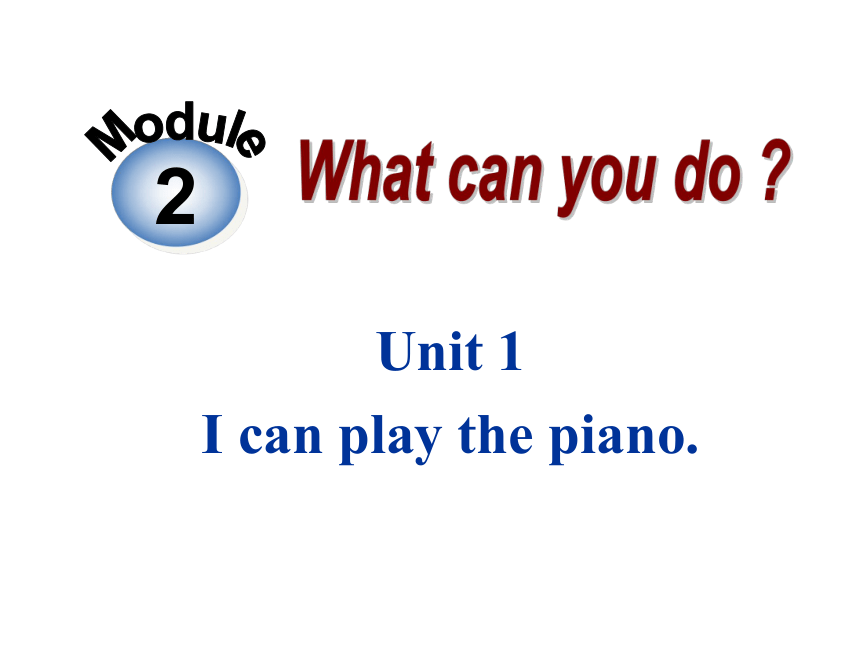 | |
| 格式 | zip | ||
| 文件大小 | 2.2MB | ||
| 资源类型 | 教案 | ||
| 版本资源 | 外研版 | ||
| 科目 | 英语 | ||
| 更新时间 | 2016-01-31 09:13:45 | ||
图片预览

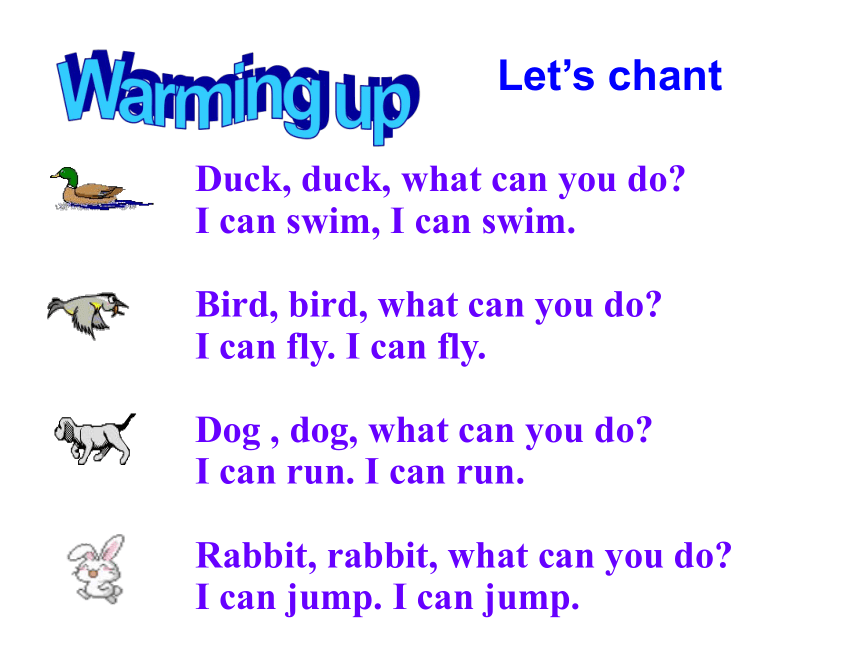
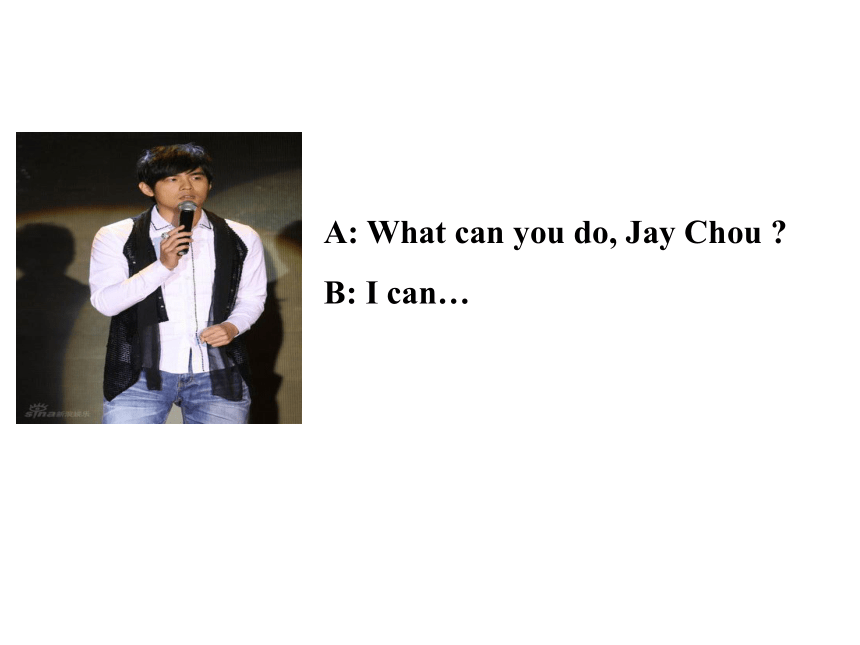
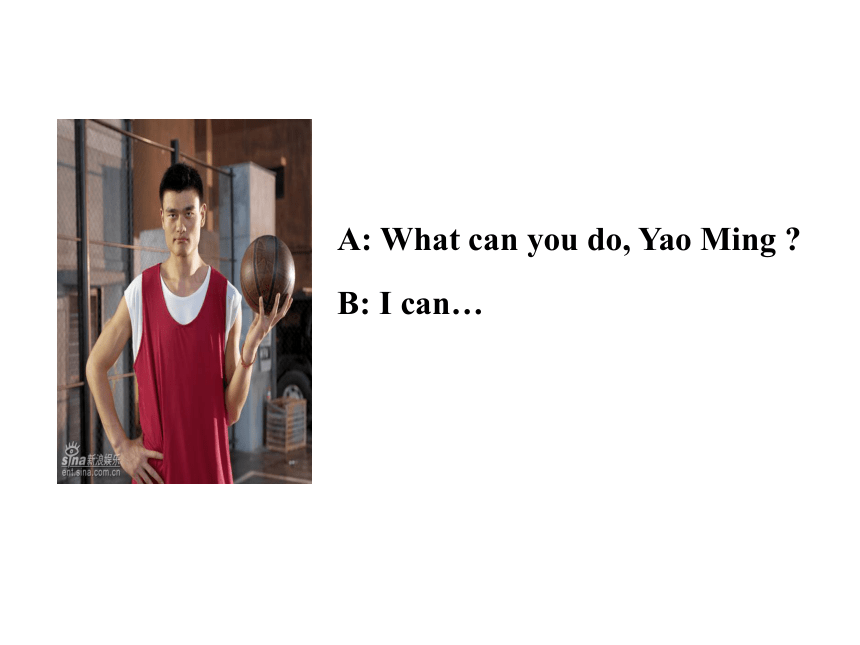
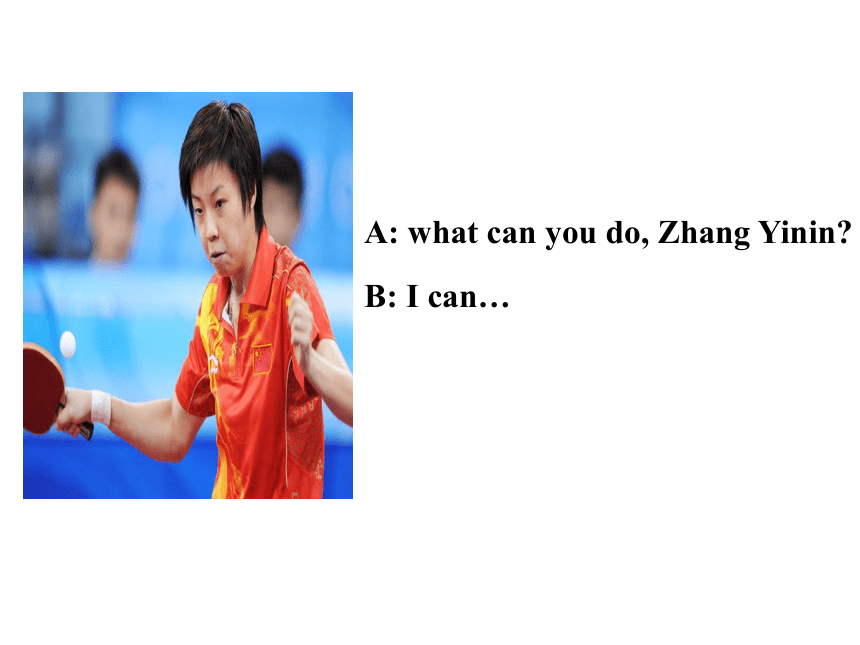
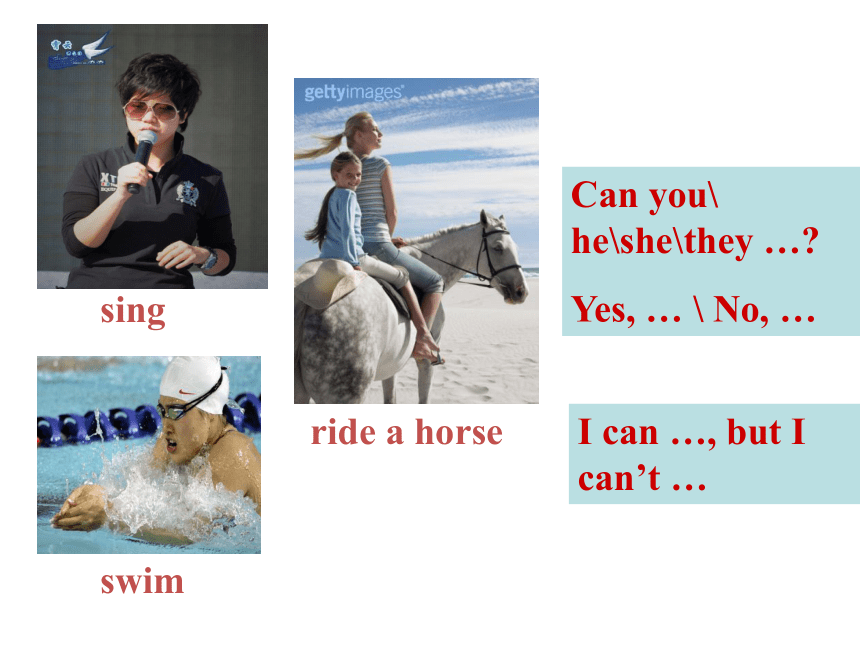
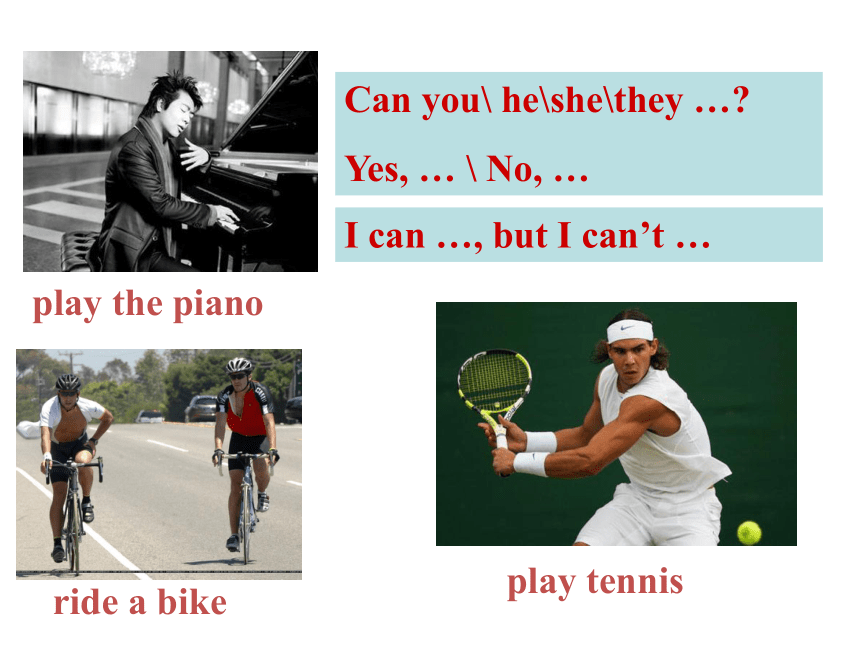
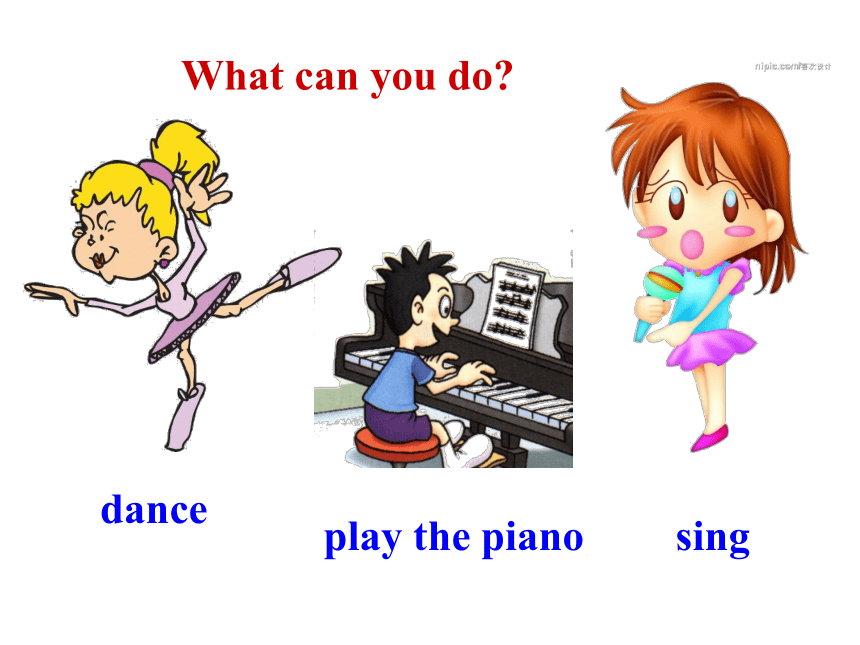
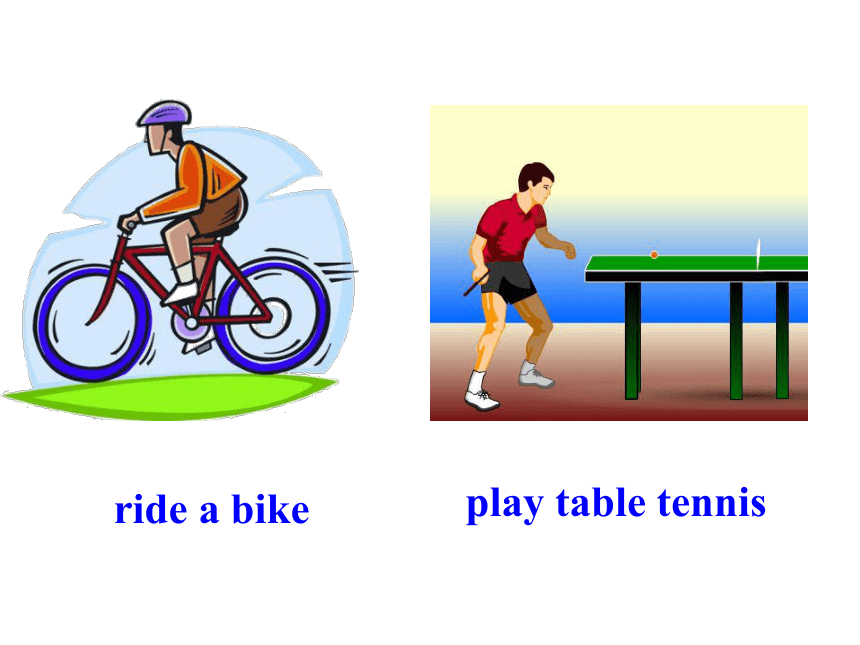
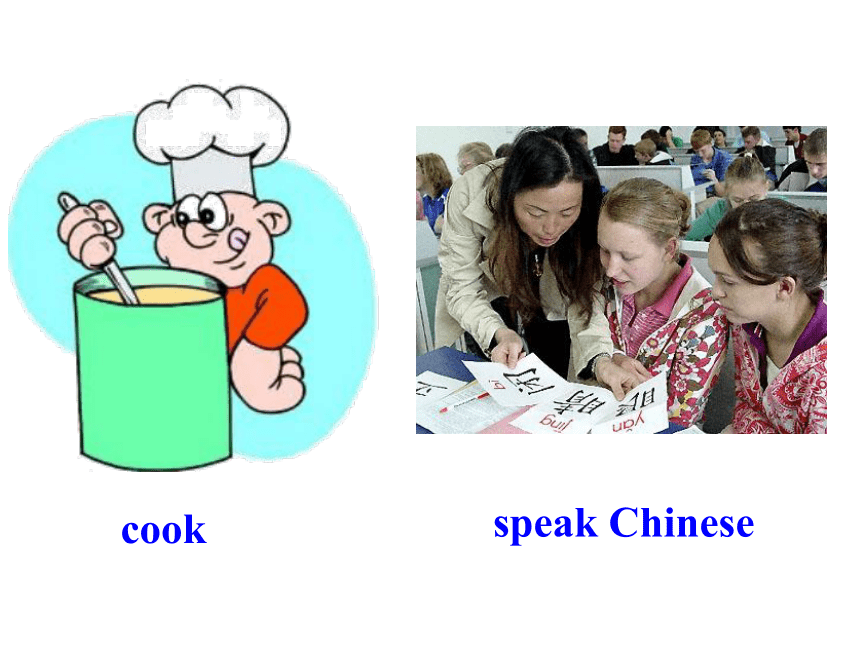
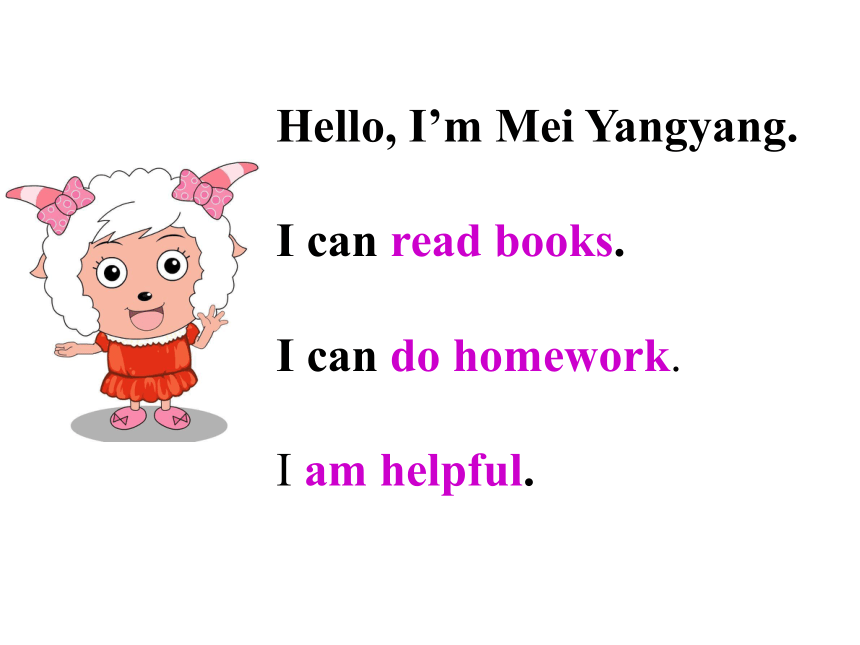
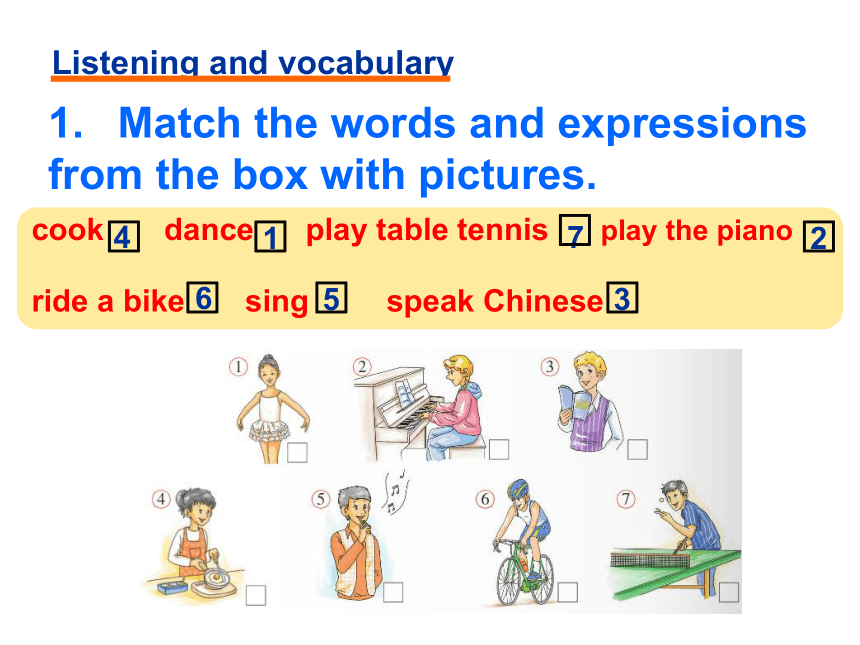
文档简介
课件56张PPT。2What can you do ?ModuleUnit 1
I can play the piano.Duck, duck, what can you do?
I can swim, I can swim.
Bird, bird, what can you do?
I can fly. I can fly.
Dog , dog, what can you do?
I can run. I can run.
Rabbit, rabbit, what can you do?
I can jump. I can jump.Let’s chantWarming upA: What can you do, Jay Chou ?
B: I can…A: What can you do, Yao Ming ?
B: I can…
A: what can you do, Zhang Yinin?
B: I can…
singswimride a horseCan you heshethey …?
Yes, … No, …I can …, but I can’t …play the pianoride a bikeCan you heshethey …?
Yes, … No, …I can …, but I can’t …play tennisdancesingplay the pianoWhat can you do?play table tennisride a bikecookspeak ChineseHello, I’m Mei Yangyang.
I can read books.
I can do homework.
I am helpful.
Listening and vocabularyMatch the words and expressions
from the box with pictures.4172653□□□□□□2. Listen and check(√) the things in Activity 1 which Tony’s dad can do.--- Can you…?
--- Yes, I can.
--- No , I can’t .
sing
dance
play cards
play basketball
play soccer
play volleyballdraw / paintswimspeak Englishplay the guitarplay chessplay the violinPair work talk about your abilitiesListen again and complete the conversation.Tony: Can you ______, dad?
Tony’s dad: No, I can’t. Why do you ask?
Tony: Because we have singing today at school. Can you _____________, Dad?
Tony’s dad: Yes, I can.singride a bikeTony: Can you _______?
Tony’s dad: Yes, I can.
Tony: Can you ________________?
Tony’s dad: No, I can’t. Can you teach me?
Tony: Ok. I can teach you Chinese after
school.
Tony’s dad: Thanks. Have a good day at
school. And please be careful!cookspeak ChineseWatch and read● Look!
●What about you?
●Don’t worry about…Do you know the clubs?art clubswimming clubmusic clubchess clubEnglish clubbasketball clubDaming: Look! The new clubs for this term are on
the board. I’d like to join the Music Club
because I can play the piano. What about
you, Betty?
Betty: I like cooking, so I can join the Food and
Drink Club. Can you cook, Daming?
Daming: No, I can’t. Well, I can cook eggs,
but that’s all. What about Lingling?
Which club can she join?3. Listen and read.Betty: I think she’d like to join the Dance Club
because she can dance really well. Tony,
how about you ?
Tony: I’d like to join the Chinese Club .I can’t
speak Chinese! So choose your favorite
club.
Tony: OK then. I play table tennis, so I choose
the Table Tennis Club. That’s my
favourite!
Now check(√) the clubs they want
to join.√√√√1. What are they talking about in this conversation?They are talking about choosing the clubs. 2. What clubs are mentioned in the conversation? The Music Club, the Dancing Club, the Table Tennis Club, the Chinese Club, the Food and Drink Club. Listen again and answer the
following questions. Read and decide these sentences true (T) or false (F).2. Daming join the food and Drink Club because he can cook eggs.1. Daming can’t join the Music Club because he can’t play the piano.3. Betty can join the Food and Drink Club because she like cooking.TFF4. Lingling can join the Dancing Club because she can’t dance well.5. Tony want to join the Chinese Club because he can speak Chinese very well.6. Tony likes playing table tennis, so the Table Tennis Club is his favourite club.FFT4. Complete the passage with the correct
form of the words from the box.board choose club music termCan you cook ? No? Join the Food and Drink
(1)________ . Can you play the piano? Join
the(2)_________ Club. What about dancing?
(3)_________The Dance Club. There are lots
of new clubs every(4)_______ . They’re all on
the(5)______and you can choose your
favourite. clubMusicChoosetermboard1. The new clubs for this term are on the board. board n.木板;布告板
Will you help me to take the size of the board?
帮忙量一下这木板的尺寸好吗?
The students put up a poster on the bulletin board.
学生们在布告牌上贴了一张海报.
Have you read the notice on the board, Mr. Wang?
王先生, 看布告板上的通知了吗? Language points2. I’d like to join the Music Club because I can play the piano. 我想加入音乐社团意为我会弹钢琴。
a) join 及物动词,“加入(团体,组织,参军)”。如:
I joined the Party in 1975.
我1975年入党。
His brother joined the army two years ago.
两年前他哥哥参军。
Tom plays soccer well. He wants to join
the soccer club.
汤姆足球踢得好, 他想加入足球俱乐部。 join 也常接人称代词的宾格形式,表示和某
人一起进行某活动;还有“连接”的意思。
如:
We want to go to a movie. Do you want to
join us?
我们想去看电影, 你和我们一起去吗?
They are planning to join the two towns by a
railway.
他们在计划用一条铁路把两个镇连接起来。
[链接] join in 参加(某些活动,如“球赛、游戏”等,常用于日常口语)。如:
May I join in your discussion?
我可以参加你们的讨论吗?
Many people join in the game every year.
每年许多人参加这个游戏活动。
He joined in the work without a second thought.
他未加思索地参加了那项工作。Will you us for lunch?
Do you mind if I you?
When do you want to us?
She listens but she never
singing.
joinjoinjoinjoins in 辨析与拓展 1. join & take part in (1) join v. 参加;加入;作……成员
join + 团体/组织,表示成为…...的一员
join the army 参军 join the Party入党
join the club 加入这个俱乐部
(2 )take part in 参加(群众性活动、会议等)
Typical exercises:
1. What club do you want to _______?
2. To keep healthy, We should ______________
school activities.join take part inb) 俱乐部名称的写法
join the swimming club
the dancing club
the singing club
the music club
the art club
the English club
the chess club
the sports club
the basketball/tennis/golf clubWhich one do you want to join? c) would like to do sth. 想要做某事
=would love to do sth.
“ would like ”意为“想要”,其语气婉转些。
具体用法如下: 1. 后面接名词或代词,表示“具体要”某样东西。例如: I’d like two sweaters for my daughters.
(我想给我的女儿们买两件毛衣。) Would you like one of these moon cakes?
(你想要一块这样的月饼吗?) 2. 后面接动词不定式,表示“愿望,喜爱”,常用于有礼貌地提出邀请、请求或建议。例如: Would you like to come to supper? d) play the piano 弹钢琴 play 在乐器前经常要加定冠词the, 但在球类、棋类等体育活动前不加任何冠词,如:
play the guitar 弹吉他
play the violin 拉小提琴
play football 踢足球
play basketball 打篮球 C1. I like music. I play _____ violin after school.
A. a B. an C. the D. /
2. Let’s play ______ basketball together.
A. a B. an C. the D. / D3. Well, I can cook eggs, but that’s all. That’s all 仅此而已,是口语中一句非常有用的表达,其用法主要有以下三种: (1) 表示仅此这些或无关紧要,意为“没别的; 没事; 没什么; 事情就是这样”。如:
A: How are you feeling?
你感觉怎么样?
B: Fine. Just a little tired. That’s all.
还好,只是有点累,没事。 Just a funny dream; that’s all.
仅仅做了个有趣的梦,如此而已。
It’s a matter of a few more miles; that’s all.
最多再有几英里,也不过如此。 A: What happened?
怎么啦?
B: Well, the wind blew the door open. I’ve closed it; that’s all.
噢, 是风把门吹开了, 我把它关上了, 没事。 (2) 表示沮丧或无可奈何,意为“没有(别的)办法”。如:
If all the seats are booked, we shall have to stay at home. That’s all.
如果全部戏票都已预售一空,我们只好呆在家里,没有别的办法。 (3) 表示说话或做事完了(或暂时完了)。意为“……完了; ……就这些”。如:
That’s all. Thank you.
我的发言完了,谢谢。
That’s all for today.
今天就到这里吧。
That’s all; you may go now.
就这些,你可以走了。 4. What about 和 how about ……怎么样?
是英语口语中常用的两个省略句型,它们的意思和用法基本相同, 后面可以加人称代词宾格,名词或者动词-ing形式。
常用的场合有:
(1)向对方提出建议或请求。例如: How about going out for a walk? 出去散散步好吗?
(2)征询对方的看法或意见。例如: What about the TV play? 那个电视剧怎么样?
(3)询问天气或身体等情况。例如: What about the weather in your home town?
Thank you. I’m very well. What about you? 5. Don’t worry about Chinese. worry可作及物动词,意为“使烦恼,使焦虑”,常接sb.作宾语。如:
What worried you so much?
什么事使你这么着急?
His bad health worried his parents greatly.
你身体不好使他的父母很发愁。 worry也可作不及物动词,意为“烦恼、担心、发愁”,常跟介词about。如:
Tell them not to worry.
告诉他们不要担心。
They are worrying about the coming exam.
他们正在为即将到来的考试而发愁。 worry about 表示“对……担心,忧虑”。如:
Don't worry / be worried about John. He'll be back soon.
不必为约翰担忧,他马上就回来。
There's nothing to worry about.
没有什么要担心的。[链接]Pronunciation and speaking5. Say the sentences aloud.
/ k?n / I can play the piano.
/kɑ:nt / I can’t speak Chinese very well.
/k?n / Can you cook?
Now listen and repeat.
Learning to learnIn English, we pronounce a word in
different ways when it is stressed or
not stressed. In “Yes, I can”, we pronounce
can as / k?n /; in “ Oh, good. You can come
to help us”, we pronounce can as / k?n /.
6. Listen and repeat./ i: / Chinese she we
/ e / egg tennis
/ I / English7. Work in pairs. Look at the information.
Ask and answer. Can Daming speak Chinese?
Yes, he can.
Can Betty play table tennis?
No, she can’t.can +动词原形Can 无人称 数量变化Yes,…can.
No,…can’t.主语+can’t+动原.Can+主语+动原…?情态动词can的用法:情态动词是辅助动词
帮助说明能力、意愿等的词,它没有人称
和数的变化, 后边直接加动词原形。肯定句:主语+can + 动词原形???
否定句:直接在can后加“not”.
????? ? He can’t (cannot) swim.
?一般疑问句直接把can提前
??? Can you dance ?
特殊疑问句:特殊疑问词+ 一般疑问句?
??? What can you do ? I can’t…,but I can…/I can…,and I can…
A: …. ,…. What can you do ?
B:I can …. ,I can …. ,can you …?
A: Yes, I can .. , and I can ….
/ No, I can’t …, but I can …..Practice the new sentences: More practice 用括号内单词的适当形式填空。
1. David can ________ (swim).
2. She can’t _________ (speak) English.
3. —Can she ______(go) to England with you? ???—No, she can’t.
4. Can I _______ (play) football this afternoon?
5. They can’t _______ (open) the window.swimspeakgoplayopen[Practice]Summary I can +v. I can’t +v.
He / She can +v . He / she can’t +v.Can you +v. …? Yes, I can.
No, I can’t.Can he / she +v. …? Yes, he / she can.
No, he / she can’t.ride a bikeplay tennis / table tennis
Introduce yourself to the class.Model: My name is …. I can sing and dance.
I can play the guitar and violin. I want to join
the music club. Homework
I can play the piano.Duck, duck, what can you do?
I can swim, I can swim.
Bird, bird, what can you do?
I can fly. I can fly.
Dog , dog, what can you do?
I can run. I can run.
Rabbit, rabbit, what can you do?
I can jump. I can jump.Let’s chantWarming upA: What can you do, Jay Chou ?
B: I can…A: What can you do, Yao Ming ?
B: I can…
A: what can you do, Zhang Yinin?
B: I can…
singswimride a horseCan you heshethey …?
Yes, … No, …I can …, but I can’t …play the pianoride a bikeCan you heshethey …?
Yes, … No, …I can …, but I can’t …play tennisdancesingplay the pianoWhat can you do?play table tennisride a bikecookspeak ChineseHello, I’m Mei Yangyang.
I can read books.
I can do homework.
I am helpful.
Listening and vocabularyMatch the words and expressions
from the box with pictures.4172653□□□□□□2. Listen and check(√) the things in Activity 1 which Tony’s dad can do.--- Can you…?
--- Yes, I can.
--- No , I can’t .
sing
dance
play cards
play basketball
play soccer
play volleyballdraw / paintswimspeak Englishplay the guitarplay chessplay the violinPair work talk about your abilitiesListen again and complete the conversation.Tony: Can you ______, dad?
Tony’s dad: No, I can’t. Why do you ask?
Tony: Because we have singing today at school. Can you _____________, Dad?
Tony’s dad: Yes, I can.singride a bikeTony: Can you _______?
Tony’s dad: Yes, I can.
Tony: Can you ________________?
Tony’s dad: No, I can’t. Can you teach me?
Tony: Ok. I can teach you Chinese after
school.
Tony’s dad: Thanks. Have a good day at
school. And please be careful!cookspeak ChineseWatch and read● Look!
●What about you?
●Don’t worry about…Do you know the clubs?art clubswimming clubmusic clubchess clubEnglish clubbasketball clubDaming: Look! The new clubs for this term are on
the board. I’d like to join the Music Club
because I can play the piano. What about
you, Betty?
Betty: I like cooking, so I can join the Food and
Drink Club. Can you cook, Daming?
Daming: No, I can’t. Well, I can cook eggs,
but that’s all. What about Lingling?
Which club can she join?3. Listen and read.Betty: I think she’d like to join the Dance Club
because she can dance really well. Tony,
how about you ?
Tony: I’d like to join the Chinese Club .I can’t
speak Chinese! So choose your favorite
club.
Tony: OK then. I play table tennis, so I choose
the Table Tennis Club. That’s my
favourite!
Now check(√) the clubs they want
to join.√√√√1. What are they talking about in this conversation?They are talking about choosing the clubs. 2. What clubs are mentioned in the conversation? The Music Club, the Dancing Club, the Table Tennis Club, the Chinese Club, the Food and Drink Club. Listen again and answer the
following questions. Read and decide these sentences true (T) or false (F).2. Daming join the food and Drink Club because he can cook eggs.1. Daming can’t join the Music Club because he can’t play the piano.3. Betty can join the Food and Drink Club because she like cooking.TFF4. Lingling can join the Dancing Club because she can’t dance well.5. Tony want to join the Chinese Club because he can speak Chinese very well.6. Tony likes playing table tennis, so the Table Tennis Club is his favourite club.FFT4. Complete the passage with the correct
form of the words from the box.board choose club music termCan you cook ? No? Join the Food and Drink
(1)________ . Can you play the piano? Join
the(2)_________ Club. What about dancing?
(3)_________The Dance Club. There are lots
of new clubs every(4)_______ . They’re all on
the(5)______and you can choose your
favourite. clubMusicChoosetermboard1. The new clubs for this term are on the board. board n.木板;布告板
Will you help me to take the size of the board?
帮忙量一下这木板的尺寸好吗?
The students put up a poster on the bulletin board.
学生们在布告牌上贴了一张海报.
Have you read the notice on the board, Mr. Wang?
王先生, 看布告板上的通知了吗? Language points2. I’d like to join the Music Club because I can play the piano. 我想加入音乐社团意为我会弹钢琴。
a) join 及物动词,“加入(团体,组织,参军)”。如:
I joined the Party in 1975.
我1975年入党。
His brother joined the army two years ago.
两年前他哥哥参军。
Tom plays soccer well. He wants to join
the soccer club.
汤姆足球踢得好, 他想加入足球俱乐部。 join 也常接人称代词的宾格形式,表示和某
人一起进行某活动;还有“连接”的意思。
如:
We want to go to a movie. Do you want to
join us?
我们想去看电影, 你和我们一起去吗?
They are planning to join the two towns by a
railway.
他们在计划用一条铁路把两个镇连接起来。
[链接] join in 参加(某些活动,如“球赛、游戏”等,常用于日常口语)。如:
May I join in your discussion?
我可以参加你们的讨论吗?
Many people join in the game every year.
每年许多人参加这个游戏活动。
He joined in the work without a second thought.
他未加思索地参加了那项工作。Will you us for lunch?
Do you mind if I you?
When do you want to us?
She listens but she never
singing.
joinjoinjoinjoins in 辨析与拓展 1. join & take part in (1) join v. 参加;加入;作……成员
join + 团体/组织,表示成为…...的一员
join the army 参军 join the Party入党
join the club 加入这个俱乐部
(2 )take part in 参加(群众性活动、会议等)
Typical exercises:
1. What club do you want to _______?
2. To keep healthy, We should ______________
school activities.join take part inb) 俱乐部名称的写法
join the swimming club
the dancing club
the singing club
the music club
the art club
the English club
the chess club
the sports club
the basketball/tennis/golf clubWhich one do you want to join? c) would like to do sth. 想要做某事
=would love to do sth.
“ would like ”意为“想要”,其语气婉转些。
具体用法如下: 1. 后面接名词或代词,表示“具体要”某样东西。例如: I’d like two sweaters for my daughters.
(我想给我的女儿们买两件毛衣。) Would you like one of these moon cakes?
(你想要一块这样的月饼吗?) 2. 后面接动词不定式,表示“愿望,喜爱”,常用于有礼貌地提出邀请、请求或建议。例如: Would you like to come to supper? d) play the piano 弹钢琴 play 在乐器前经常要加定冠词the, 但在球类、棋类等体育活动前不加任何冠词,如:
play the guitar 弹吉他
play the violin 拉小提琴
play football 踢足球
play basketball 打篮球 C1. I like music. I play _____ violin after school.
A. a B. an C. the D. /
2. Let’s play ______ basketball together.
A. a B. an C. the D. / D3. Well, I can cook eggs, but that’s all. That’s all 仅此而已,是口语中一句非常有用的表达,其用法主要有以下三种: (1) 表示仅此这些或无关紧要,意为“没别的; 没事; 没什么; 事情就是这样”。如:
A: How are you feeling?
你感觉怎么样?
B: Fine. Just a little tired. That’s all.
还好,只是有点累,没事。 Just a funny dream; that’s all.
仅仅做了个有趣的梦,如此而已。
It’s a matter of a few more miles; that’s all.
最多再有几英里,也不过如此。 A: What happened?
怎么啦?
B: Well, the wind blew the door open. I’ve closed it; that’s all.
噢, 是风把门吹开了, 我把它关上了, 没事。 (2) 表示沮丧或无可奈何,意为“没有(别的)办法”。如:
If all the seats are booked, we shall have to stay at home. That’s all.
如果全部戏票都已预售一空,我们只好呆在家里,没有别的办法。 (3) 表示说话或做事完了(或暂时完了)。意为“……完了; ……就这些”。如:
That’s all. Thank you.
我的发言完了,谢谢。
That’s all for today.
今天就到这里吧。
That’s all; you may go now.
就这些,你可以走了。 4. What about 和 how about ……怎么样?
是英语口语中常用的两个省略句型,它们的意思和用法基本相同, 后面可以加人称代词宾格,名词或者动词-ing形式。
常用的场合有:
(1)向对方提出建议或请求。例如: How about going out for a walk? 出去散散步好吗?
(2)征询对方的看法或意见。例如: What about the TV play? 那个电视剧怎么样?
(3)询问天气或身体等情况。例如: What about the weather in your home town?
Thank you. I’m very well. What about you? 5. Don’t worry about Chinese. worry可作及物动词,意为“使烦恼,使焦虑”,常接sb.作宾语。如:
What worried you so much?
什么事使你这么着急?
His bad health worried his parents greatly.
你身体不好使他的父母很发愁。 worry也可作不及物动词,意为“烦恼、担心、发愁”,常跟介词about。如:
Tell them not to worry.
告诉他们不要担心。
They are worrying about the coming exam.
他们正在为即将到来的考试而发愁。 worry about 表示“对……担心,忧虑”。如:
Don't worry / be worried about John. He'll be back soon.
不必为约翰担忧,他马上就回来。
There's nothing to worry about.
没有什么要担心的。[链接]Pronunciation and speaking5. Say the sentences aloud.
/ k?n / I can play the piano.
/kɑ:nt / I can’t speak Chinese very well.
/k?n / Can you cook?
Now listen and repeat.
Learning to learnIn English, we pronounce a word in
different ways when it is stressed or
not stressed. In “Yes, I can”, we pronounce
can as / k?n /; in “ Oh, good. You can come
to help us”, we pronounce can as / k?n /.
6. Listen and repeat./ i: / Chinese she we
/ e / egg tennis
/ I / English7. Work in pairs. Look at the information.
Ask and answer. Can Daming speak Chinese?
Yes, he can.
Can Betty play table tennis?
No, she can’t.can +动词原形Can 无人称 数量变化Yes,…can.
No,…can’t.主语+can’t+动原.Can+主语+动原…?情态动词can的用法:情态动词是辅助动词
帮助说明能力、意愿等的词,它没有人称
和数的变化, 后边直接加动词原形。肯定句:主语+can + 动词原形???
否定句:直接在can后加“not”.
????? ? He can’t (cannot) swim.
?一般疑问句直接把can提前
??? Can you dance ?
特殊疑问句:特殊疑问词+ 一般疑问句?
??? What can you do ? I can’t…,but I can…/I can…,and I can…
A: …. ,…. What can you do ?
B:I can …. ,I can …. ,can you …?
A: Yes, I can .. , and I can ….
/ No, I can’t …, but I can …..Practice the new sentences: More practice 用括号内单词的适当形式填空。
1. David can ________ (swim).
2. She can’t _________ (speak) English.
3. —Can she ______(go) to England with you? ???—No, she can’t.
4. Can I _______ (play) football this afternoon?
5. They can’t _______ (open) the window.swimspeakgoplayopen[Practice]Summary I can +v. I can’t +v.
He / She can +v . He / she can’t +v.Can you +v. …? Yes, I can.
No, I can’t.Can he / she +v. …? Yes, he / she can.
No, he / she can’t.ride a bikeplay tennis / table tennis
Introduce yourself to the class.Model: My name is …. I can sing and dance.
I can play the guitar and violin. I want to join
the music club. Homework
同课章节目录
- Module 1 Lost and found
- Unit 1 Whose bag is this?
- Unit 2 Are they yours?
- Unit 3 Language in use
- Module 2 What can you do ?
- Unit 1 I can play the piano
- Unit 2 I can run really fast
- Unit 3 Language in use
- Module 3 Making plans
- Unit 1 What are you going to do at the weekends?
- Unit 2 We're going to cheer the players.
- Unit 3 Language in use
- Module 4 Life in the future
- Unit 1 Everyone will study at home
- Unit 2 Every family will have a small plane.
- Unit 3 Language in use
- Module 5 Shopping
- Unit 1 What can I do for you?
- Unit 2 You can buy everything on the Internet
- Unit 3 Language in use
- Module 6 Around town
- Unit 1 Could you tell me how to get to the Nationa
- Unit 2 The London Eye is on your right.
- Unit 3 Language in use
- Revision module A
- Module 7 My past life
- Unit 1 I was born in a small village.
- Unit 2 I was born in Quincy.
- Unit 3 Language in use
- Module 8 Story time
- Unit 1 Once upon a time….
- Unit 2 Goldilocks hurried out of the house.
- Unit 3 Language in use
- Module 9 Life history
- Unit 1 He left school and began work at the age of
- Unit 2 He decided to be an actor.
- Unit 3 Language in use
- Module 10 A holiday journey
- Unit 1 What did you do?
- Unit 2 This morning we took a walk.
- Unit 3 Language in use
- Module 11 Body language
- Unit 1 They touch noses!
- Unit 2 Here are some ways to welcome them.
- Unit 3 Language in use
- Module 12 Western music
- Unit 1 It's so beautiful!
- Unit 2 Vienna is the centre of European classical
- Unit 3 Language in use
- Revision module B
